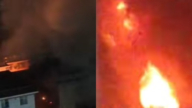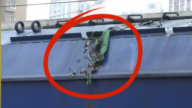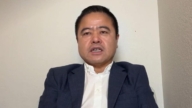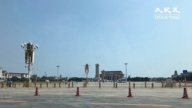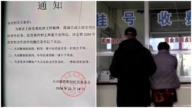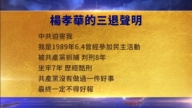【新唐人2013年03月02日訊】嚴重急性呼吸綜合症(Severe Acute Respiratory Syndrome,SARS)—— 薩斯,中國大陸稱為「非典」。10年前,中國大陸有5327人感染「非典」、349人死亡。這場嚴重的公共衛生危機改變了許多人的命運。當年因揭露薩斯病而遭到中共當局軟禁的蔣彥永醫生也是其中一位。他在「SARS十週年紀念座談會」上再度強調:真話的重要性。另外,大陸媒體刊登有關薩斯危機發生十週年的長篇報導。報導認為,當年薩斯病的發生,對中共政府重大信息披露起到了重大促進作用。然而有評論指出,表面上,中共是有一套重大訊息披露程序,但實際上還要看領導的意圖行事。
28號,在北京局行的「SARS十週年紀念座談會」,有20多名醫學人員、薩斯病患和媒體人士出席。因揭露北京薩斯疫情而遭中共軟禁的老軍醫蔣彥永,也出席座談會。82歲高齡的他強調:講真話最重要,講真話並不困難,也不要怕講錯。
據報導,參與座談的還有《中國青年報》圖片總監賀延光,他回憶當年薩斯疫情爆發時的經過,他說,「2月就聽說了,4月20號以後才能有報導。我們媒體太聽話了!」他還表示,10年過去了,有些事還不能講。
中國大陸網路作家荊楚:「西方的媒體,以揭露社會的醜陋陰暗的事情為職責。中國的媒體,就是報喜不報憂,喪事當成喜事辦。老百姓生不如死了,他媒體上是到處鶯歌燕舞,形勢一片大好,不是小好,而是越來越好。這就起了一個矇蔽、麻醉國人的作用。」
而大陸最新一期的《中國新聞週刊》,也刊登有關薩斯危機發生十週年的長篇報導。作者認為,當年薩斯病的發生,對中國政府重大信息披露起到了「重大促進作用,成為中國公共衛生史上的一個轉捩點和里程碑。」
深圳獨立學者朱建國在接受《自由亞洲電臺》訪問時表示,他本人並沒有看到中共政府在重大信息披露方面,因為薩斯病而有所進步。
深圳獨立學者朱建國:「我看到今天有一條消息報了,廣東有一個地方出現了口蹄疫。現在已經非常嚴重了,但是在事前,在苗頭狀態的時候一點消息都沒有。就像當年的非典(即薩斯病)一樣,最初他們(中共)也是沒有披露,到最後已經不可隱瞞的時後,才披露。習近平雖然說政府要多聽聽批評,但是我們看到的實際:評論和批評的版面卻越來越少。」
時政評論家藍述則向《新唐人》表示,中共官員之間關係盤根錯節,官員說真話,將牽一髮而動全身。
時政評論家藍述:「中共的官員上下互相之間,有一種提拔的關係,所以說這個關係盤根錯節,牽一髮而動全身,所以他要說真話的時候,他要考慮還會影響到誰,提拔他的人和被他提拔的人,所以他會考慮很大的一個問題,所以最後就是啥都不說了。」
藍述還表示,所謂的訊息披露的進步,還是拜互聯網所賜。
藍述:「是因為互聯網的迅速發展,所以有很多事情它(中共)瞞不住了,那瞞不住的話就只有公開了,那麼,對於一些直接威脅到中共的政權穩定的重大的消息,它是絕對不報導的。」
朱建國也認為,在重大信息披露方面,中國只是制定了一批看上去很好看的披露程序,但實際上還要看領導的意圖行事。
朱建國:「主要領導他開口了,你才能夠弄(披露重大信息)。那個程序都是假的,是空的。這就像中國的憲法和法律不知道(制定)有多少,但是實際上呢?」
中國工程院院士鐘南山,也是抗擊薩斯的旗幟性人物。日前他在接受媒體採訪時也表示,目前應對突發公共衛生事件,最突出的問題就是疾病信息的覆蓋和上報。他說:「個別地區上報的病例數和死亡人數不夠準確,這與某些地方官員擔心這些數字會影響自己的政績有關。」
採訪/劉惠 編輯/黃億美 後製/郭敬
Any Progress on Information Disclosure?
Severe Acute Respiratory Syndrome, (SARS), was called
‘atypical pneumonia’ in mainland China.
10 years ago, (Chinese media) reported 5,327 people infected
with SARS in mainland China and 349 people died.
This serious public health crisis has changed the
fate of many people.
Dr. Jiang Yanyong, who exposed the SARS epidemic, was under
house arrest by the Chinese Communist Party (CCP).
He once again stressed during the SARS 10th anniversary
symposium the importance of telling the truth.
In addition, the mainland media published lengthy reports
about the SARS epidemic tenth anniversary.
The report said that when SARS occurred, it played a significant
role in promoting disclosure of major information to the CCP.
However, it was said that, on the surface, the CCP has a set of
information disclosure procedures.
In reality it acts according to the leadership’s intent.
On February 28th the SARS 10th anniversary symposium
was held in Beijing.
More than 20 medical personnel, SARS patients,
and the media were invited to attend.
Jiang Yanyong was also invited under house arrest due to
exposing SARS.
Jiang, aged 82, stressed that “It is most important to tell the truth,
but not difficult, do not be afraid to say anything wrong.”
According to reports, He Yanguang, the director of photos
of the China Youth Daily also attended.
He recalled the process of the outbreak of the SARS epidemic.
He said," We heard in February, but were only allowed
to report on April 20th. We media were too obedient,"
He also said that, 10 years later, some things still cannot
be spoken out loud.
Internet writer Jing Chu: “Western media duties
are to expose the ugly dark things in the society.
But media in China reported nothing but good news,
and even handle a funeral as a happy event.
The people felt better to die rather than to live.
The (CCP) media were full of the joy of spring saying the
situation is excellent, not trivial, but getting better and better.
This played a role to blind and anesthetize the people."
The latest issue of Newsweek in mainland China also published
lengthy reports about the SARS crisis tenth anniversary.
The authors suggested that when SARS occurred, it played a
“significant role in promoting disclosure of information to the CCP,
becoming a turning point and milestone in the history
of public health.”
Independent scholar Zhu Jianguo in Shenzhen
was interviewed by Radio Free Asia.
He said he did not see any progress of the CCP in the
disclosure of major information because of SARS.
Zhu Jianguo: “I read in the newspaper that in Guangdong
there were foot-and-mouth disease outbreaks.
Although it was reported, the epidemic is now very serious.
There was no information disclosure of the epidemic when
it just appeared. Just as SARS, it was not disclosed initially.
When the development of the epidemic couldn’t be concealed,
the CCP only then disclosed it to the public.
Xi Jinping said the Government should listen more to criticism,
actually see the forums of comment and criticism become fewer."
Political critic Lan Shu told NTD television that there are deep-
rooted relations between the CCP officials;
if officials spoke the truth, it will indeed affect them all.
Lan Shu: “There is a promotion relationship between
the CCP officials of different levels.
This makes the relationship become deeply rooted.
It indeed affects the whole body, if one tells the truth.
So he will have to consider whom will be affected among
those who promoted him and whom he promoted.
He will be considered a big problem,
so consequently he said nothing in the end."
Lan Shu also said that the so-called progress of message
disclosure is thanks to the Internet.
Lan Shu: “Since the internet developed, a lot of things could
not be concealed by the (CCP), then it had to disclose them.
But for some news having a direct threat to the stability of
the CCP regime, it is will never report it.”(Voice from RFA)
Zhu Jianguo also believes that in the disclosure of
major information,
China just developed a disclosure program which
looks very nice, but depends on leadership intending to act.
Zhu Jianguo: “If principal leaders did not allow it,
nobody dared to disclose major information.
The information disclosure procedures developed are
false and inane.
It’s like the Chinese Constitution and relevant laws
are enacted well, but how they were actually carried out?"
Zhong Nanshan, an academic of China Academy of Engineering,
was also a public figure in the movement against SARS.
In a recent media interview, he also said currently to respond to
public health emergencies, the most prominent problem is the coverage and reporting of disease information.
He said, the reported number of cases and deaths
in some regions were not accurate enough.
“It is related to some local officials worried that these figures
will affect their own achievements.”



